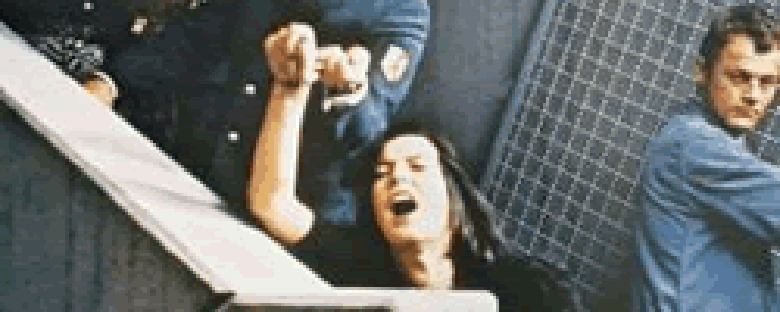Reviews
Die Verlorene Ehre Der Katharina Blum
Volker Schlöndorff and Margarethe von Trotta
Germany, 1975
Credits
Review by Rumsey Taylor
Posted on 11 July 2004
Source The Criterion Collection DVD
Katharina Blum is arrested on charges of aiding a known terrorist, an action that inspires immediate and abundant media interest. She is released from booking and a slew of photographers, cameras, and journalists await with poised questions. She cowers her head, and a policeman clenches her hair, forcing her head upright into the discriminating view of the press, whose “duty,” he claims, “is to inform the public.”
As this scene denotes, there is a double focus throughout The Lost Honor of Katharina Blum. Firstly the film concerns a woman whose innocence is subjective and unknown. Second, the media plays a key role in the film. It is the source of harmful exploitation, and, as the film’s contradictive and unexpected ending will tell, it reserves a certain, hypocritical responsibility.
The film opens with a man under heave surveillance. He steals a Porsche and is next seen at a party. In this brief series of events, we see as he locates Katharina, they dance, and she invites him to her apartment at the end of the evening. The following morning, a S.W.A.T. team forcibly intrudes upon Katharina’s apartment. The man is missing.
The duty or action of the male terrorist is withheld, forcing the viewer to judge according to individual actions and not past affiliations. It is clear Katharina aided him, though not if her hospitality was knowingly illegal. Both the media and law assume a bias the viewer cannot in measuring Katharina’s intentions.
It is defended in Criterion’s edition of the film, which includes an interview with directors Volker Schlöndorff and Margarethe Von Trotta, that Katharina Blum affords a renewed societal relevance due to recent terrorist activity. The film is concerned with potential menace, the sort of threat that inspires collective paranoia. It depicts a government eager to blame, and without legitimate targets they are able to locate. Katharina Blum is a fictional case within a lens of subjectivity that affords a clear contemporary resonance.
The press depicted in the film (labeled with the demonstrative and generic title The Paper) has an exploitative drive and, as such, the mythic ability to procure truth. The Paper only publishes words that will aid in the myth of conspiracy, which only aids in Katharina’s conviction. At a confrontation late in the film, a journalist employed to relay Katharina’s story in The Paper states, aptly, “You’re news.”
Katharina’s male companion, the source of her questionable conviction, never supplies any truths about his affiliations or activity (he is described as an “anarchist” in the film, without any defended reasoning). Nor, for the matter, are Katharina’s intentions detailed, aside from her sexual attraction to him. At the film’s end, even, little guilt is assigned, forcing the viewer to judge according to limited evidence for both parties in conflict.
Schlöndorff would direct future recognizable films, though it is speculatively Von Trotta (whose catalogue is largely unfamiliar), who injects the film with a feminist sensibility. Though, again, Katharina’s guilt is unknown, it is her depiction that dons an identifying sympathy.
The Lost Honor of Katharina Blum ends with an unexpected funeral scene. It involves the death of a member of the press, and his elegy in which the media’s responsibility is defended. Because of the statement’s context — again, a death — it affords a contradictive irony. The film depicts the press with questionable means (in one scene a reporter throws a wad of cash at Katharina’s feet; figuratively, she is his whore), and justifies them at the end. It is a scene whose themes transcend the social conflict that provoked it.
We don’t do comments anymore, but you may contact us here or find us on Twitter or Facebook.



